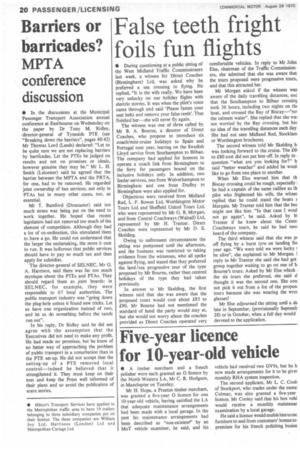Barriers or barricades?
Page 22

If you've noticed an error in this article please click here to report it so we can fix it.
MPTA conference discussion
• In the discussions at the Municipal Passenger Transport Association annual conference at Eastbourne on Wednesday on the paper by Dr Tony M. Ridley, 'director-general of Tyneside PTE (see "Breaking down the barriers", pages 40-42) Mr Thomas Lord (Leeds) declared: "Let us be quite sure we are not replacing barriers by barricades. Let the PTEs be judged on results and not on promises or ideals, however genuine they may be." Mr L. H. Smith (Leicester) said he agreed that the barrier between the MPTA and the PRTA, for one, had to be removed. He regarded joint ownership of bus services, not only in PTAs but in many other cases, too, as essential.
Mr T. Bamford (Doncaster) said too much stress was being put on the need to work together. He hoped that recent legislation had not removed too much of the element of competition. Although they had a lot of co-ordination, this stimulated them to have a go. He could not understand that the larger the undertaking, the more it cost to run. It was ludicrous that public services should have to pay so much tax and then apply for subsidies.
The director-general of SELNEC, Mr G. A. Harrison, said there was far too much mystique about the PTEs and PTAs. They should regard them as joint boards: in SELNEC, for example, they were responsible to 67 local authorities. The public transport industry was "going down the plug-hole unless it found new tricks. Let us have one organization instead of two, and let us do something before the sands run out".
In his reply, Dr Ridley said he did not agree with the assumption that the Executives did not need to make any profit. He had made no promises, but he knew of no better way of approaching the problem of public transport in a conurbation than in the PTE set-up. He did not accept that the setting-up of a PTE removed local control—indeed he believed that it strengthened it. They must keep on their toes and keep the Press well informed of their plans and so avoid the publication of scare stories.
































































































